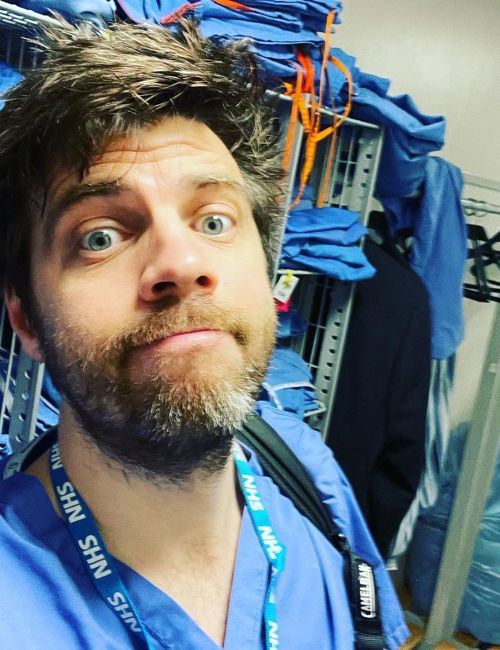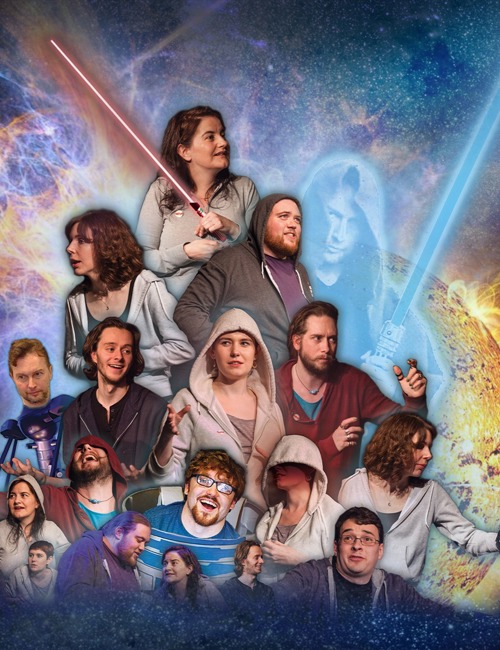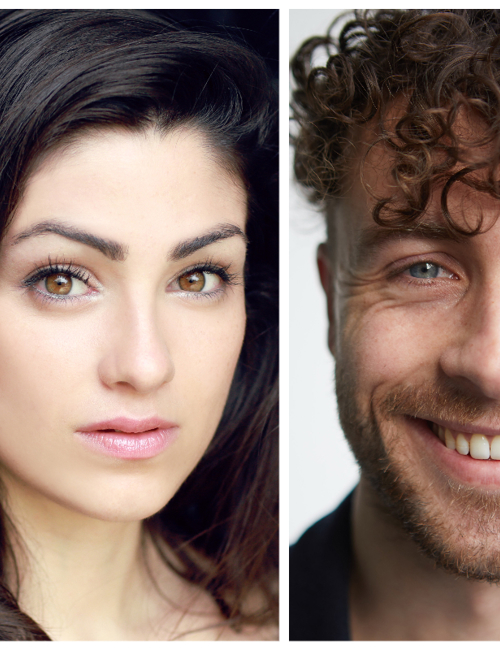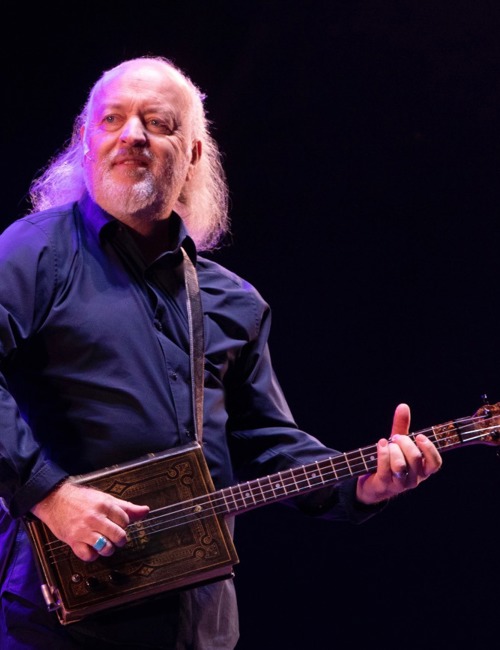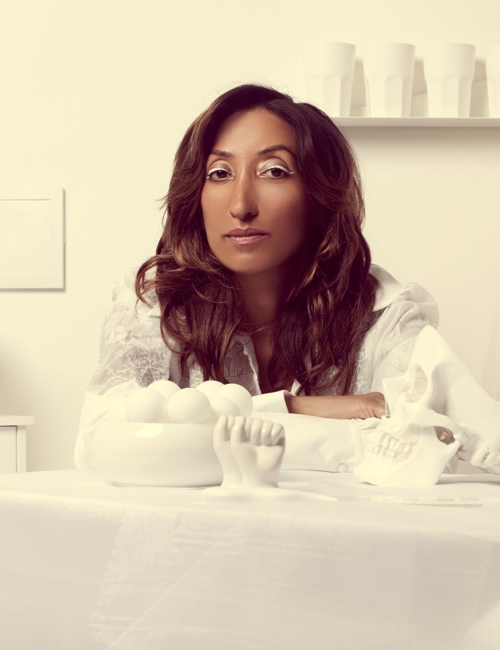He's worked with vampires, ghosts and Ricky Gervais. Now Colin Hoult is bringing his new comedy show to Nottingham and reveals to us how it all began, as a child, in the shadows of Mapperley...

A big Leftlion welcome. Please give us a sneak preview of the new show...
The show’s called Colin, and it's basically about me and my dad, who are both called Colin. My dad called me Colin for some weird reason. We don't know why, he's no longer with us. And it's about me trying to reconnect with him. I've now got a boy myself, and I'm neurodiverse. So it's about growing up in Nottingham as a kid, and trying to understand the way people saw things back then, and how I can apply it to now. It's all fun, observational family comedy about growing up in that world.
So, are we doomed to make the same mistakes as our parents?
Oh, that's a big question! Do I think that? No, I don't and one of the main reasons is knowledge. It's through learning. For example, it really upsets me when people say, ‘Why do you have to have a label.’ They’re really missing the point. I've got ADHD, and self-diagnosed autism. (As I say, I'm self-diagnosed but then I'm also a self-diagnosed wonderful lover.)
These people don’t understand how much explanation and understanding and agency a diagnosis gives you. Knowing where you're from and why things were the way they were. So having that knowledge makes a huge difference. It just gives shape and meaning to everything.
When you tell your kids off, apparently, you use the voice your parents would use on you. Apparently, it just instinctively kicks in. But I definitely don't think we're doomed. Otherwise, we'd all be using the cane.
Do you think the entertainment industry is doing enough for people with ADHD and neurodivergence?
I don't. I don't know if there'll ever be enough. When I come onstage and bring up the ADHD and neurodiversity stuff that so many shows talk about now, I instinctively in my head hear a groan from the audience. As in, oh God, another one! But this show, I deliberately look at it from my background, as a 45-year-old dad and more importantly, the previous generation's background.
For example, when we grew up we didn't need words like autism, ADHD, neurodiversity, we just had a simple phrase that covered everything: He's not right. Which I don't agree with, obviously, that's very damaging, but it's a way in. But I think as an industry, and this is similar to the Black Lives Matter, and #MeToo stuff, it likes to present itself as appearing very pro people with neurodiversity. But is the reality different? For example, you get an email with an insane amount of information just thrown at you. I got one yesterday, and I don't want to be: Oh, boo-hoo, I can't do that email. But there's no awareness that it’s overwhelming and bombarding. You do feel like an idiot. I told this to a producer once, and he was like, ‘Well, nobody told me about this’.
Some reports say up to a third of people might be autistic. It's not this tiny, niche thing that we should all be up in arms because people are going over the top. It's across the board. Even if you're not neurodiverse, I think there's still something in being aware of what other people need and just having the conversation around that.
I said to my Mum, can we just play a Christmas game? And she said, let's do a ouija board
You're leaving your old characters like Anna Man behind. Why?
In a word, ADHD. Yeah, I get very bored, very quickly. But when I say I'm leaving my characters behind, it's not that I'll never do a character again. With Anna, it was a wonderful journey, and it really did help me come out of myself and learn a lot about myself, weirdly. Since then, it's been very interesting doing stand-up as myself. It took me a long time to accept being on stage as myself and that I had stories to tell, and opinions to show.
I feel like Anna was very loved, but it couldn't go further, you know? I tried a lot of pilots and stuff everyone loved. But it just couldn't break through. I think there's a lot of reasons for that, but also, I don’t want to get stuck. I can't imagine myself doing the same character all my life.
Not when I had these stories to tell. I had the main bulk of the story, which is about a Christmas where I said to my Mum, can we just play a Christmas game? And she said, let's do a ouija board. And my show is based around that central story. I actually wrote that routine 10 years ago, and tried it out a few times, but I just got cold feet. And then the show sort of evolved from there. And what's nice is this just feels like the beginning. To use a geeky metaphor, this is my Batman Begins journey. Then we'll do the Dark Knight, and then it will drop off, and we'll have Tom Hardy in it, with that weird accent.
I read you grew up with a fear of being sent to Mapperley hospital?
My bedroom window opened onto Mapperley Hospital’s tower. This terrifying Victorian obelisk right outside my window. And when you're kids, you tell stories and stuff. And we always grew up with horror stories, and Halloween and ghosts were real to us, and it was quite terrifying in a way. But there’s that vein of terror that if you show your neurodiverse side you'll get put Mapperley Hospital.
Yet, in reality, a friend of mine did some research and discovered Mapperley hospital was actually the most progressive hospital in the world, at the time. So far from this terrifying thing that we'd grown up with. It was the first place to let people out into the community, and get rid of bars on the windows. Quite amazing.
Did you enjoy being a vampire?
In Being Human? Yeah, that was my first big, big job. And I absolutely loved it. Maybe I loved it slightly too much. I haven't watched it since, to be honest, because I watched it at the time, and I felt my performance was massive. Everyone else was playing it at a very low level. Mostly whispering. Then I'm there like my vampire. I'm my own worst critic when it comes to watching it. And I'd say, not to blow my own trumpet, but acting wise, I can be more the sort of ‘Jack Nicholson actor’ chewing up the scenery. Growing up in a household where we're obsessed with vampires and werewolves and Stephen King and stuff, it was fantastic. I grew up on all the Christopher Lee stuff and that.
What advice would you give young people aspiring to a career in comedy?
The first thing is to just go out and do it. You know, so many people don't do it. I mean, the ADHD is a real superpower in this sense. I can just write a load of mad stuff down and then go out and do it that night.
Really?
Yeah, that's how I started. We used to go to the Sketch Club, me and my comedy partner, in Crouch End in London. For some reason, we thought you had to do a new show every week, which you didn't. We didn't realize people did the same material over and over. So, we’d write a new sketch every week and then just do it. But I always, almost my detriment sometimes, won't learn stuff properly or rewrite it, or, edit or anything. I just do a big page and then go out and say it all. And it's really exciting, you know, I love that. That thrill.

So, my advice is, don't wait. Because the worst thing is, when you see someone doing it and there's a glaze over their eyes, and they're trying to remember what they've written.
In all honesty, I was very lucky right from the beginning, I've always felt a genuine connection with the audience. I feel more at home there than in normal life, where I can get very overwhelmed and stressed. But on stage, this thing happens. The best thing is to go out there, because your act never comes out how you think it will. You know, the response never is. That’s why I do loads and loads and loads of gigs. That's the best way. And keep trying, keep experimenting. Don't compare yourself to other people. Don't try and be like anyone. Just keep on and you'll find the thing you know that you love.
Do you have a writing process?
It’s very spontaneous. I try to get it all out as soon as I can. I work with my wife, Kat. She's very good at structuring and saying where stuff doesn't quite work. But yeah, just going over and over it, is the best way getting it all out and then finding the rhythm of it and the poetry of it. Sometimes there's certain words just land better and funnier.
I'm not allowed to speak about it just yet
What's next for Colin?
Well, I'm developing work off the back of the tour, which is really exciting. Fingers crossed. I've had a lot of developments over the years, uh, scripts, pilots and stuff. But nothing has really gone beyond a certain stage, apart from my radio work, obviously. It feels really exciting at the minute. Me and Kat are basically working out how we take those stories and their world and turn it hopefully into a sitcom. So, it's early stage. And then, yeah, I'm gigging lot and appearing in a few things coming out soon, a very royal scandal, shall we say? Annoyingly, because I'm not allowed to speak about it just yet.
I've got my podcasts as well. It was called Into the Neuroverse, but I'm changing it to Diary Of A Neurodiverse Dad, which is basically where I just talk through being neurodiverse and life. It's not all about neurodiversity. It goes off all sorts of tangents.
Colin Hoult's Colin plays at the Nottingham Arts Theatre on Thursday 3 October 2024.
We have a favour to ask
LeftLion is Nottingham’s meeting point for information about what’s going on in our city, from the established organisations to the grassroots. We want to keep what we do free to all to access, but increasingly we are relying on revenue from our readers to continue. Can you spare a few quid each month to support us?
